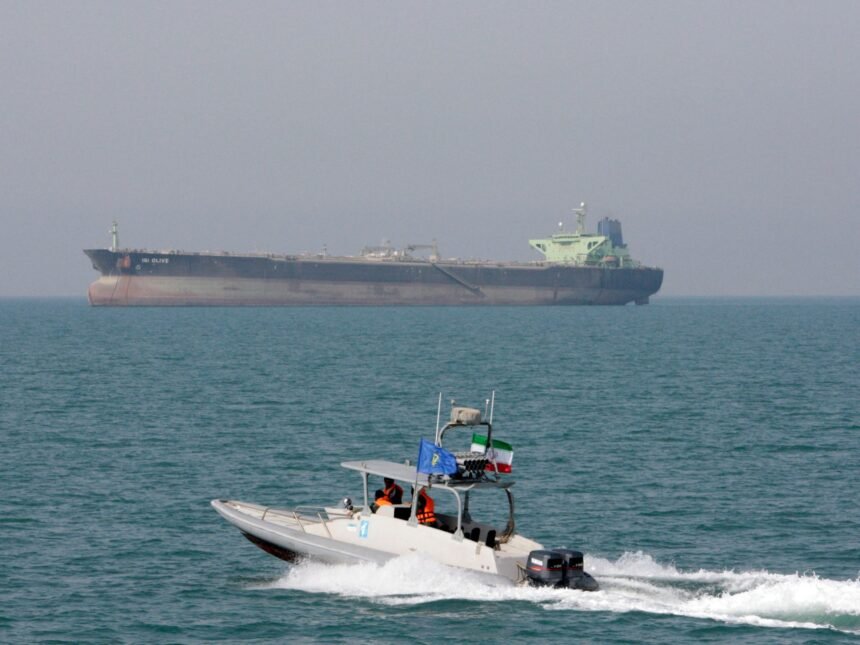Israel’s strike on navy and nuclear websites, and Iran’s retaliation, have rocked already strained world provide chains.
As airways droop flights to Tel Aviv, Tehran and different airports throughout the area, oil corporations, transport companies, and regulatory companies are scrambling amid rising considerations that key commerce routes just like the Strait of Hormuz might be caught within the crossfire.
Service provider transport remains to be passing via the Strait of Hormuz, however with elevated warning. Iran has beforehand threatened to shut this crucial commerce route in response to Western strain. Even the suggestion of such a transfer has already despatched shockwaves via world markets, and the worth of oil has risen.
United States President Donald Trump’s newest rhetoric has executed little to ease these considerations. He warned that if Iran doesn’t “make a deal”, there might be extra “demise and destruction”.
“If america is perceived to be concerned in any assaults, the chance of escalation will increase considerably,” Jakob Larsen, chief security and safety officer with transport affiliation BIMCO, instructed the Reuters information company.
Oil Costs Rise
As of 4:00pm in New York (20:00 GMT), Brent crude costs, that are thought-about the worldwide commonplace, are 5 p.c larger than yesterday’s market shut.
Oil futures spiked greater than 13 p.c at one level, reaching their highest ranges since January.
Any closure of the Strait of Hormuz, a strategic commerce route between the Arabian Gulf and the Gulf of Oman, via which roughly 20 p.c of the world’s world oil output travels, would possible drive oil costs even larger. This might intensify inflationary pressures globally, and notably within the US.
The worth surge comes on the heels of a better-than-expected Client Value Index report within the US earlier this week, which confirmed costs elevated by simply 0.1 p.c for the month. Power prices stay a key inflation driver. Petrol costs, actually, fell 2.6 p.c in the course of the interval. Client sentiment, too, jumped for the primary time in six months as tariff fears eased. Nevertheless, the brand new battle may minimize brief the reduction that US customers had expressed, in accordance with analysts from JPMorgan Chase.
Wait and see
“Sustained positive aspects in vitality costs may have a dire influence on inflation, reversing the months-long development of cooling shopper costs within the US,” commodity researchers for JPMorgan Chase mentioned in a be aware launched on the heels of the strike. “We proceed to imagine that any political insurance policies which may drive oil and inflation larger would possible yield to Trump’s main goal of sustaining low vitality costs—a marketing campaign promise,” analysts Natasha Kaneva, Prateek Kedia, and Lyuba Savinova wrote.
The markets extra broadly dropped on the information. The S&P 500 tumbled 1.1 p.c, the Dow Jones Industrial Common is down 1.7 and the Nasdaq is 1.3 p.c decrease.
“At present, as you’ll be able to see from the markets, whether or not it’s the S&P, whether or not it’s Bitcoin, issues have been sort of secure or flat. So there’s a little bit little bit of a wait-and-see method. Oil is acutely affected just because Iran is such a big a part of the worldwide oil provide. However to date, Israel has avoided hitting in any extreme style the oil infrastructure of Iran. Ought to that change, that can clearly have a way more dramatic influence,” Taufiq Rahim, an impartial geopolitical strategist and Principal for the 2040 Advisory, instructed Al Jazeera.
If transport via the crucial seaway have been suspended, even quickly, the Worldwide Power Company mentioned it’s nicely equipped to launch emergency reserves, if wanted. Nevertheless, that comes with the chance of depletion.
There are 1.2 billion barrels in its strategic reserves. The world makes use of about 100 million barrels of oil per day.
“If it does rise to the extent of closing the Strait of Hormuz, nicely, now that’s going to be the most important oil shock of all time,” Matt Gertken, chief geopolitical strategist and senior vp at BCA Analysis, a macroeconomic analysis agency, instructed Al Jazeera.
OPEC Secretary-Normal Haitham al-Ghais criticised the IEA for its assertion that it may launch strategic reserves, saying it “raises false alarms and tasks a way of market concern via repeating the pointless have to probably use oil emergency shares”.
This comes amid elevated strain for the group of oil-producing nations to extend output. Earlier this month, OPEC+ members agreed to lift manufacturing by 411,000 barrels for the month of July.
The Strait of Hormuz stays open for now. International locations, together with Greece and the UK, have suggested ships to keep away from the Gulf of Aden, the physique of water between Yemen and Somalia that connects to waterways which might be near Israel, and to log all voyages via the Strait, in accordance with paperwork first seen by Reuters.
Additional escalation on the horizon?
Iran may assault Iraq to cut back the worldwide oil provide to additional escalate tensions. In January 2024, Iran attacked Iraq, which it mentioned was in retaliation for armed assaults inside its personal territory, The New York Instances reported.
“We must always assume that we’re going to lose each Iranian and Iraqi oil manufacturing, which brings us to the purpose the place we might be seeing 5 to seven million barrels per day taken offline,” Gertken instructed Al Jazeera.
Gertken believes Iran would do that to impress the West.
“They need to take out some oil provide, however not assault Saudi Arabia or shut the Strait of Hormuz as a result of, in fact, that may be sure that the US enters the battle. They should goal some regional manufacturing [where] they’ll have believable deniability [and blame] some militant group.”
